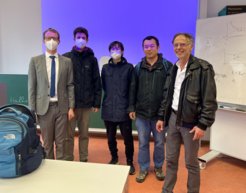Roman Bause and his team develop new cooling method for polar molecules
After five years in the "NaK Molecules" lab of the Quantum Many-Body Systems division, Roman Bause has successfully completed his PhD. Congratulations!
With his dissertation project, he contributed significantly to the development of a new microwave technique that allows polar molecules to be cooled to record low temperatures, a few nanokelvin above absolute zero. The innovative cooling method brings ten years of intensive research to a close. The new technique will be used in the near future to develop quantum many-body systems from molecules that could previously only be built from atoms.

In his doctoral thesis, which he completed in the Quantum Many-Body Systems division, Roman Bause studied the cooling of polar molecules. He aimed to cool them down to the lowest possible temperatures, namely close to absolute zero at minus 273.15 degrees Celsius. Fifteen years ago, it had already been possible to approach these low temperatures experimentally, but the last step - reaching the 'critical' limit of 10 nK, 10 billionths of a degree from absolute zero - turned out to be incredibly difficult. This is because only at these low temperatures do molecules begin to exhibit their special quantum properties, which researchers want to better understand and exploit for the development of new technologies.
In the end, a combination of optimised, already-known techniques and the application of new methods proved successful. Previous experiments failed mainly because the molecules - why, has not yet been fully explained - get lost as soon as they come too close to each other. The newly developed cooling method uses a strong microwave field that causes the molecules to repel each other. It is now possible to bring molecules to temperatures about 10 times lower than before. In the future, it will be possible to build quantum many-particle systems from molecules which until now could only be built from atoms. "I am very grateful for my team," Roman Bause explains, "none of what we have achieved would have been possible without my colleagues."
Roman Bause was and is very happy to be at the MPQ: "There was always something fascinating to do, and I especially enjoyed the atmosphere of mutual support and commitment to research," he says.
What's next?
Since completing his PhD, Roman Bause has been continuing his work at MPQ as a postdoctoral researcher. From February 2023, he will move to the University of Groningen where he plans to work on the precision measurement of molecules.












